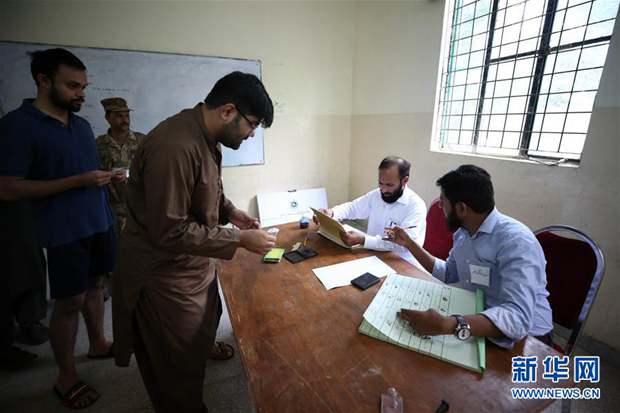A new Pakistan emerging after election
- By Sabena Siddiqi
 0 Comment(s)
0 Comment(s) Print
Print E-mail China.org.cn, July 30, 2018
E-mail China.org.cn, July 30, 2018

Casting their ballots for Pakistan's second consecutive democratic transfer of power, nearly 106 million registered voters participated in the July 25 general election.
Winning big in the largest province, Punjab, is vital for any party wanting to form a government at the center, as it contains 60 percent of the total electorate. Registering an overall 50 to 55 percent voter turnout, as in the 2013 vote, one new feature was the 22 million young, new voters, of which 16 percent were under the age of 25.
Achieving 137 seats is mandatory if a party is to earn the right to nominate a candidate for Prime Minister. Before the election, a hung parliament was predicted; however, now it seems there will be a clear majority.
Maintaining a commanding lead with more than half the total vote counted at the time of writing, cricketer-turned-politician, Imran Khan is all set to lead the nation. In his first post-election address he pledged following a program of austerity while eliminating vestiges of feudalism, promoting educational quality, streamlining government and improving its efficiency.
Having promised to change Pakistan for the better, his vision was popular with the masses, and he seems to have successfully introduced the winds of change after a struggle of 22 years in politics.
Announcing his 11-point election manifesto, including working against corruption, abuse of power and injustice, he also showed a strong desire to tackle housing problems facing the impoverished section of the population and create 10 million new jobs.
Urging the people of Pakistan to stand by him to help achieve his dream, he has stressed that "it is time to think big, time to change our destiny and time to build a new Pakistan."
Managing to win the largest amount of seats in the National Assembly, along with a sizable number in the Punjab and Khyber Pakhtunkhwa provinces even if perhaps not a "simple majority," a coalition is possible with the help of independent candidates or some other smaller parties.
Significantly, all the religious parties fared badly, which is a good sign as only moderate, liberal parties can determine a positive way forward for the country. Moreover, this factor is vital in balancing relations with the rest of the world. Not only that, ethnic parties also suffered a reverse, with the average Pakistani preferring with a national presence.
The main challenges lying ahead are averting an immediate balance of payments crisis and working on economic stability. Recently, water conservation has become necessary due to an impending scarcity and building dams is top priority.
Regarding foreign policy, Pakistan will continue fostering amicable ties with all its neighbors and allies, as well as maintaining a positive role in regard to regional organizations like the BRI, SCO, and SAARC.
Especially where the China Pakistan Economic Corridor project is concerned, continuity is expected as it remains a project between two governments, not political parties. Foreign investment will be brought in on the basis of CPEC and new trade opportunities explored.
Even in the past, Pakistan has achieved continuity and succeeded in completing its nuclear program notwithstanding any change of government so there is no reason why the CPEC projects will not keep on moving ahead.
Though there were complaints about vote rigging, it seems to have been a free and fair, well organized election. Such upsets do happen when the people want change and it is not that unusual that traditional parties have suffered setbacks yet salvaged their position with the PMLN as the second largest party and the PPP as the third.
As announced by EU Observers monitoring the election: "We have observed smooth polling and many of our recommendations seem to be implemented and the security situation seems improved."
Out of 50 recommendations made by this group after the last election, 36 were implemented and included in the electoral law. Verily, a pivotal moment for the nation as a completely new team takes over.
Notably, social media campaigning helped empower voters by allowing them to interact with politicians and make their views known to them. As many as 800,000 police and military forces managed election security, which progressed peacefully on the whole. On a positive note, the Pakistan Stock Exchange also saw a significant increase in activity with the prospect of economic stability.
Sabena Siddiqui (Twitter: @sabena_siddiqi) is a foreign affairs journalist and lawyer based in Pakistan.
Opinion articles reflect the views of their authors, not necessarily those of China.org.cn.






Go to Forum >>0 Comment(s)